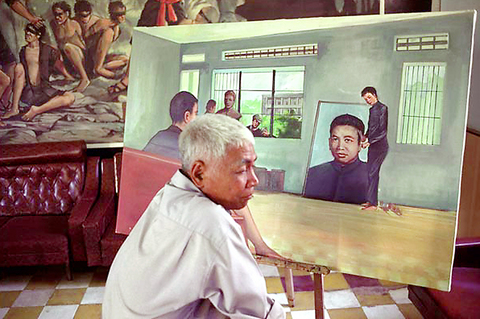When Cambodia recently staged a national film festival, serious drama was in gruesomely short supply: almost half the entries were low-budget horror flicks.
It wasn't always thus.
In the 1960s, now-retired King Norodom Sihanouk was not only the patron of a Cambodian film industry, he was one of its most active practitioners. He wrote, directed and even acted in his own high-minded if formulaic romances and tragedies.

PHOTOS COURTESY OF FOX MOVIES
More than 300 Cambodian films were made during that vibrant era, some well-received in other Asian countries.
But when the communist, puritanical Khmer Rouge regime came to power in the mid-1970s it banned all kinds of entertainment and smashed cameras and film-making equipment.
As the country's spirit began to recover from the Khmer Rouge era, and economic revival took hold in the early 1990s, the industry began to rebound. More than 100 production houses sprang up, mostly using video equipment to churn out movies on a shoestring.
But most of them collapsed because of their amateurism, and the industry is still struggling to recover its former glory.
These days, about five movie making companies have the expertise and strong finances to succeed, said Chheng Sovanna, head of the Culture Ministry's movie production office.
``Most of them are accidental producers, who just spent US$3,000 on a camera, bought some tapes, turned on the light and started shooting,'' said Chheng Sovanna, himself a director who graduated from Russia's State Institute of Cinematography. ``We don't understand the way they make movies.''
And the filmmakers lean more toward anarchy than artistry on screen.
At the recent festival, a typical movie featured a female vampire baring her canine teeth in a grin as she looked for prey. In Nieng Arp, or Lady Vampire, a flying female head with internal organs dangling beneath it chased a terrified couple in the dark.
Nine of the festival's 22 entries were in a similar vein.
``We make movies to suit the domestic market and the demand of our youths,'' said Korm Chanthy, the manager of FCI Productions, which made Nieng Arp.
``They like to watch horror movies because they make them feel excited, thrilled and terrified,'' he said.
The government wasn't impressed. The filmmakers ``injected too much hallucination and superstition'' into their work, complained Culture Minister Prince Sisowath Panara Sirivuth.
``Their understanding of moviemaking is that it's just business,'' he said. ``And they have this misperception that, without training, they can still make movies.''
The government has touted the idea of establishing a film school, but in a country so poor and reliant on foreign aid as Cambodia the idea is unlikely to get off the ground anytime soon.
Producer, 29-year-old Heng Tola, was looking to diversify his computer business when he founded Campro three years ago with several friends.
Making a movie takes Campro about three months and costs an average of US$30,000, including about US$1,000 for the lead actor, he said.
Despite the current taste for horror movies, Heng Tola believes a more serious trend is emerging, prompted in part by the resentment many Cambodians feel about its colonial past and toward domineering neighbors such as Thailand and Vietnam.
One of the festival entries was a nationalistic epic about a peasant protest against high tax imposed by Cambodia's colonial rulers, the French.
``The Cambodian movie is being reborn after a long absence. Its existence has been up and down, and the question now is how we can make it really stand,'' Heng Tola said.

June 2 to June 8 Taiwan’s woodcutters believe that if they see even one speck of red in their cooked rice, no matter how small, an accident is going to happen. Peng Chin-tian (彭錦田) swears that this has proven to be true at every stop during his decades-long career in the logging industry. Along with mining, timber harvesting was once considered the most dangerous profession in Taiwan. Not only were mishaps common during all stages of processing, it was difficult to transport the injured to get medical treatment. Many died during the arduous journey. Peng recounts some of his accidents in

What does the Taiwan People’s Party (TPP) in the Huang Kuo-chang (黃國昌) era stand for? What sets it apart from their allies, the Chinese Nationalist Party (KMT)? With some shifts in tone and emphasis, the KMT’s stances have not changed significantly since the late 2000s and the era of former president Ma Ying-jeou (馬英九). The Democratic Progressive Party’s (DPP) current platform formed in the mid-2010s under the guidance of Tsai Ing-wen (蔡英文), and current President William Lai (賴清德) campaigned on continuity. Though their ideological stances may be a bit stale, they have the advantage of being broadly understood by the voters.

Artifacts found at archeological sites in France and Spain along the Bay of Biscay shoreline show that humans have been crafting tools from whale bones since more than 20,000 years ago, illustrating anew the resourcefulness of prehistoric people. The tools, primarily hunting implements such as projectile points, were fashioned from the bones of at least five species of large whales, the researchers said. Bones from sperm whales were the most abundant, followed by fin whales, gray whales, right or bowhead whales — two species indistinguishable with the analytical method used in the study — and blue whales. With seafaring capabilities by humans

In a high-rise office building in Taipei’s government district, the primary agency for maintaining links to Thailand’s 108 Yunnan villages — which are home to a population of around 200,000 descendants of the Chinese Nationalist Party (KMT) armies stranded in Thailand following the Chinese Civil War — is the Overseas Community Affairs Council (OCAC). Established in China in 1926, the OCAC was born of a mandate to support Chinese education, culture and economic development in far flung Chinese diaspora communities, which, especially in southeast Asia, had underwritten the military insurgencies against the Qing Dynasty that led to the founding of